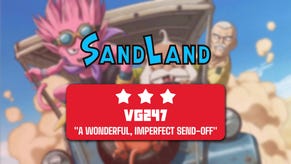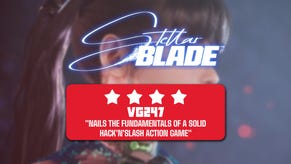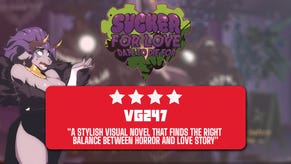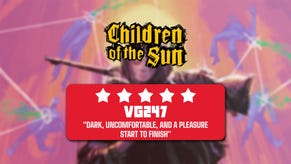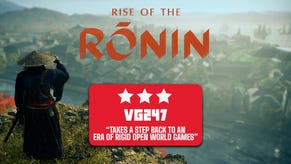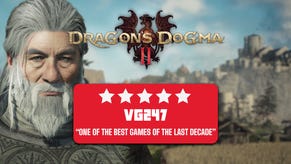Etrian Odyssey Untold 2 3DS Review: Conquering the White Whale
Jeremy finds lots to love in Atlus' latest (and biggest) portable dungeon-crawler.
This article first appeared on USgamer, a partner publication of VG247. Some content, such as this article, has been migrated to VG247 for posterity after USgamer's closure - but it has not been edited or further vetted by the VG247 team.
Etrian Odyssey took me by surprise when it debuted in 2007: Somehow, it took a seemingly humdrum genre, the first-person dungeon crawler, and transformed it into something I couldn't stop playing. Sure, I love classic games and I love RPGs, but this style of game had its heyday in the early '80s and never really evolved once the RPGs I enjoy began to take form. And yet, despite all expectations, Etrian Odyssey proved to be an addicting masterpiece.
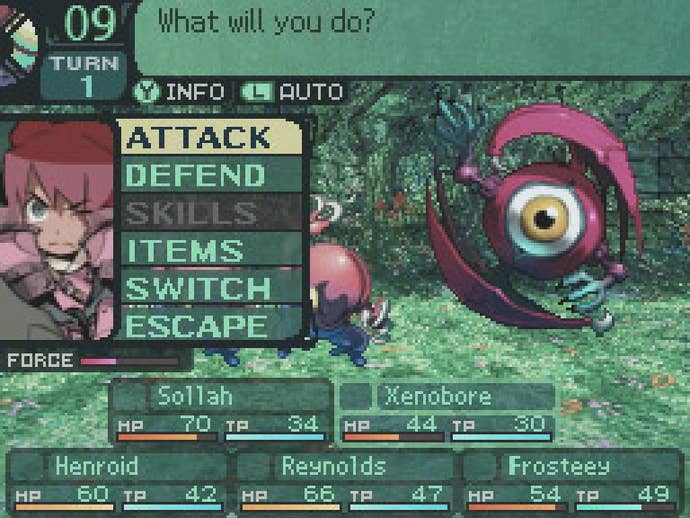
It also proved to be a huge, huge time sink, one that took me the better part of a year of on-again-off-again play to conquer. The sequel arrived soon after my triumph, and I took that one even more slowly. Over the course of several months, I slowly wore a grid of grooves into the lower screen of my poor DS from the constant map-making; after all, one of the greatest things about the Etrian games is their emphasis on drawing virtual maps, an integral rendition of the cartography essential to besting those old PC RPGs that brilliantly makes use of the DS and 3DS touch screen feature. I developed a rhythm of sitting in bed for a little while each night, slowly charting out progress into the labyrinth before falling asleep.
I did a lot of dumb things while playing Etrian Odyssey II. I ruined the lower screen of a limited-edition DS Lite. My late night play sessions caused my brain to develop an association between portable RPGs and sleep, so now it's hard for me to play handheld adventures without feeling drowsy. But worst of all, I played like an idiot.
I never finished Etrian Odyssey II, despite making it all the way to the 23rd floor of 25 — a task that represented dozens of hours. I made the terrible mistake of hitting the level cap with my tank character upon arriving at 23F. Unlike its predecessor, EOII offered players the opportunity to respec a character by reverting their level to 1, and I had an important strategic revelation once Ellysia the Protector dinged max level: Rather than squander experience with a maxed-out character, I should send her back to level 1 and enjoy the resulting skill point bonuses and heightened level cap. So, I returned to the dungeon with a low-level heroine leading the party, her frailty somewhat compensated for by all her sweet, high-level gear. Upon my return, I immediately opened a door in the center of the dungeon level and met the Colossus.
According to the Etrian Odyssey fan wiki, Colossus is "absurdly powerful, possibly the strongest foe the heroes will face during their journey." Surprise! Every other boss in EOII appeared on the fifth floor of a stratum, leading me to expect I still had a couple of floors in which to buff up my fresh-faced paladin to fighting shape. But instead, I essentially approached the game with the strategic equivalent of trying to defeat a wheat thresher by throwing babies at it. Things went poorly in less than two turns, and the realization dawned on me that I had irrevocably screwed myself over by making a bad, permanent choice literally steps in front of the toughest battle in the normal game.
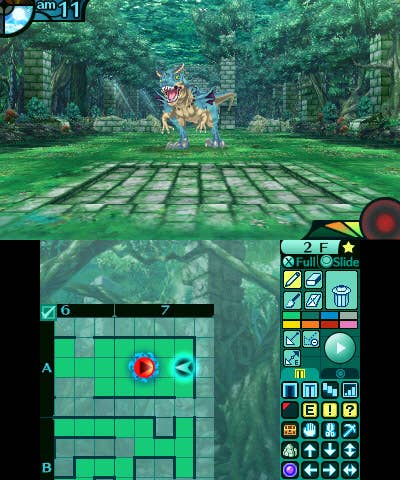
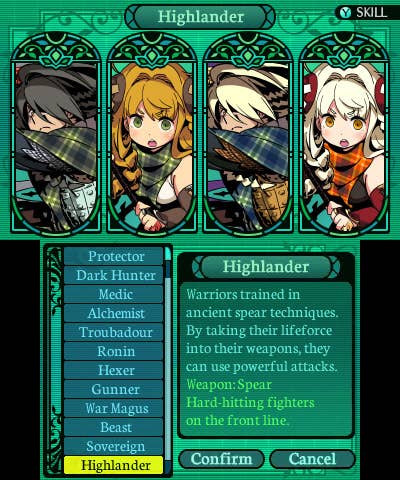
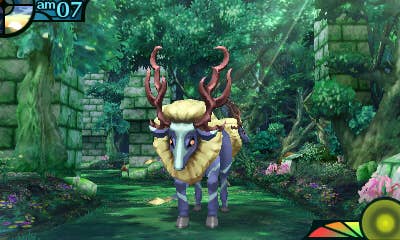
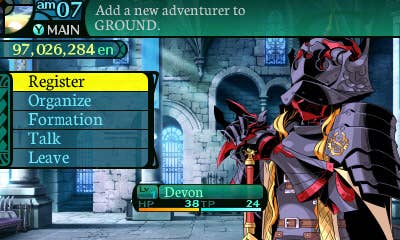
After a couple hours spent attempting to grind poor Ellysia some extra stats, I eventually had to face facts and accept defeat. While she was returning to competence, her teammates were hitting their own level caps, and I could feel my soul evaporating at the prospect of entering some endless cycle of asynchronous grinding.
To date, Etrian Odyssey II remains my white whale of the series — the one that defeated me. Or at least the one that provided the medium in which I defeated myself, anyway. And so, Etrian Odyssey Untold 2, which debuts today on 3DS, offers me my shot at redemption. Here at last is my opportunity to put right my terrible failing.
I haven't pulled it off yet, though. While Untold 2 offers a fairly faithful remake of EOII, it also incorporates a comprehensive remake mode that shuffles things around considerably. It won't be completely unfamiliar to anyone who played through the first Untold; while the new story mode hits similar narrative beats and transpires through a labyrinth mirrored after the classic mode's, it's not the same experience at all. Nor does the difference lie entirely in the added dialogue — the entire concept of your character party is radically different from one mode to the next.
The classic mode of EOII allows you to recruit a guild of generic characters: You select a warrior's class and one of a handful of available portraits, give them a name, and build their skills and traits as you see fit. You have more than enough space to create one guild member of each class, including the downloadable Highlander (the special class to which Untold's protagonist belonged), but you can only strike out with five party members at a time.
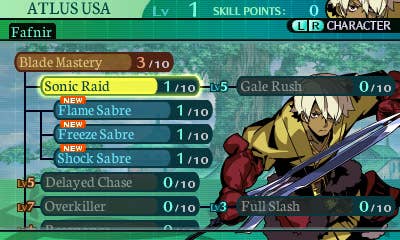
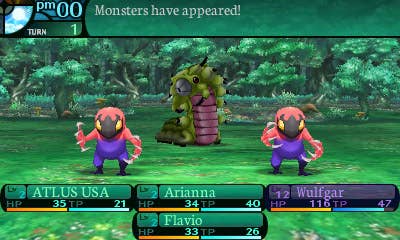
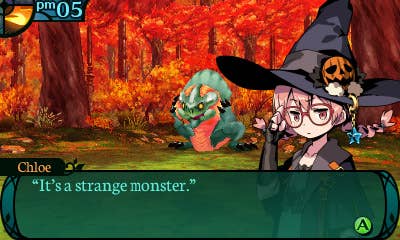
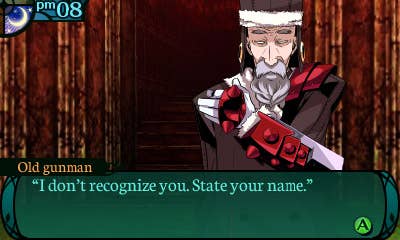
The story mode, on the other hand, hands you a predetermined party of named characters, each of whom has a defined personality and role in the game. It's a far more limiting setup, as you can only work with the balance the designers have provided. Some limited customization is available through the use of Grimoire Stones, which thankfully are much more straightforward here than the mess that appeared in the first Untold; each stone allows a character to equip an additional skill, and the more you level up the more stones each party member can hold. You can also swap stones with folks you Street Pass, which means that if you luck into a connection with a high-level player you can exchange your pile of garbage stones (they accumulate quickly!) in exchange for some super-boosted skill.
Still, even this feature is inherently limiting: The Grimoire Stone system pushes you toward loading down party members with powers they already have. While you can give, say, your durable Protector stones that let him cast elemental magic, you could instead choose to give him stones spawned from his own abilities, which then add a level bonus to his powers. That approach is hardly mandatory, of course, and the stones do offer a flexible way to generalize, min-max, or alternate between the two approaches on the fly.
Nevertheless, the party mix is much more specific in story mode than in classic; much of the fun of Etrian adventures comes from making choices about how to balance your team — do you go with classes that offer straightforward combat skills, or do you prefer more supporting roles to flesh out the ranks? — and that's far more difficult in story mode. For example, you don't actually have a standard healer skill option — you have to rely on the princess' Monarch-class passive healing buffs or the war magus' quirky approach to health restoration. Again, the Grimoire Stones compensate for this, but you really have to play the game's way.
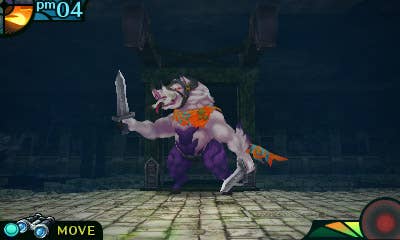
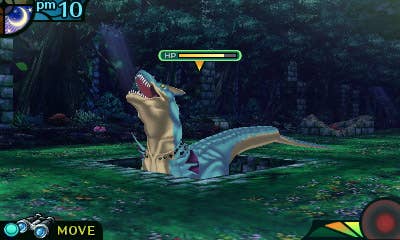
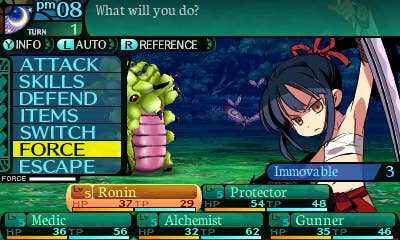
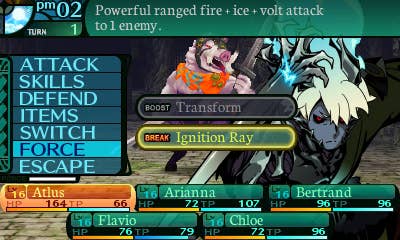
The story mode compensates for its party limitations with unique skills. The protagonist — the Fafnir Knight mentioned in the subtitle — has a fairly bizarre class setup with tons of specialized skills, but the complexity of his fundamentals is balanced by the straightforward ass-kicking approach that his transformation ability offer. The hero can choose to metamorphose into an alternate form for three turns, massively increasing his damage output and durability; a strategically timed transformation can tip the balance of a tough battle in the player's favor, and the Fafnir form also offers a sacrificial option in which you can temporarily give up the option to transform again for the remainder of a dungeon outing in exchange for a high-powered ultimate attack.
The protagonist isn't alone in his emergency skills; each party member possesses his or her own Force skill — a limit break — which have been greatly enhanced over the Force powers in the original EOII. Each character has an individual Force meter rather than sharing one among the party, and each Force skill also offers a Break option that ends the three-turn Force status early in exchange for some kind of major boon. The princess' Break skill, for example, is an absolutely invaluable party buff that restores both health and precious Tech Points to every character. It's practically easy mode, since the challenge of most major Etrian Odyssey battles isn't so much the raw damage numbers being thrown around but rather enduring drawn-out fights. Sure, your guild can hold its own against a boss or F.O.E.... until they run out of TP, at which point there are no more buffs, heals, elemental skills, or binds and the battle quickly goes south. When you can recharge your entire party in a single move right as the tide of the fight begins to turn against you, things feel far less daunting.
Speaking of F.O.E.s, they put in an appearance in both modes as well. The story mode really changes things up, making the process of dealing with these wandering monsters reminiscent of the puzzle-like mini-bosses that appeared throughout last year's Persona Q (an Etrian game in all but name). EOII began developing F.O.E.s into more elaborate exploratory challenges, playing with the concept of the creatures by giving them the ability to pass through walls and even fail to appear on the party's radar, and Untold 2 expands on this considerably. The first stratum, for example, forces you to lure raving dinosaurs into handy traps, while the interstitial dungeon unique to the story mode features massive pig guards who have to be evaded through cautious use of drawbridges and circular paths. These chases grow in complexity pretty quickly, and it's always a good idea to carry an extra Ariadne Thread to escape the dungeon in the very likely chance you get yourself trapped.
There's a lot to recommend in Untold 2. While Etrian games and spinoffs are coming a bit too quickly even for a super-fan like myself, this is balanced out by the fact that each one improves on the last. Untold 2 is practically two games in one, given the massive differences between the straightforward classic mode and the narrative-driven story mode, which throws in all sort of meta-game elements like a town-building sim (taken straight from this spring's Etrian Mystery Dungeon) and a cafe where you can develop recipes that grant your party semi-permanent boosts and buffs.
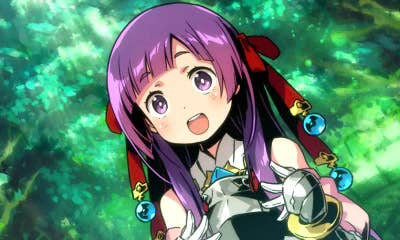
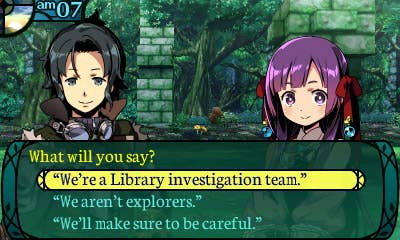
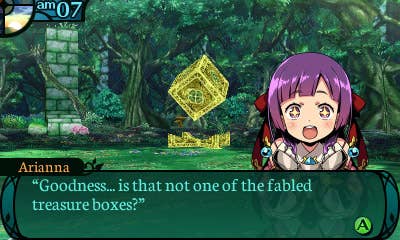
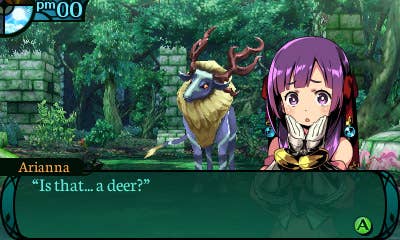
It's as smart a game as I am a foolish player. While I haven't done anything as blatantly idiotic as EOII's quest ending re-spec, I'm still fighting my way uphill here. Untold 2 offers a huge number of save slots — a welcome change from the single slot of the DS days — so I've been playing both classic and story mode in parallel rather than rushing through one for my review. I still have a way to go before I can fully weigh in on the game with a proper, scored review. But I can certainly say that from the few dozen hours I've invested so far, Untold 2 ranks up at the very top of the Etrian series. I'm not sure if I like it quite as much as Etrian Odyssey IV, but it's a magnificent dungeon crawler that offers two wildly different play modes, a wealth of customization options, and multiple difficulty levels — very much a game for any RPG fan, whatever their tastes and personal sense of grit and determination.
Update: Final thoughts (for now)
A week later, I still haven't beaten any version of Etrian Odyssey II — though it's not for a lack of interest or desire. It's more due to a lack of focus, as I've split my time between both the classic and story modes.
After putting a few dozen hours into my dual journey up the world tree, I'm declaring this the best entry in the Etrian Odyssey series to date. I have a few minor complaints about the game, but nothing serious. On the contrary, Untold 2 offers a wealth of options and features to position it as the single most playable and approachable entry in the entire franchise: A continuation of the trend that has defined the Etrian games since they made the jump to 3DS.
Where Etrian Odyssey IV may not have made itself quite accessible enough for the average player and Etrian Odyssey Untold arguably went too far, the second Untold strikes a perfect balance. From the high-level perspective, Untold 2 is a remake of 2009's Etrian Odyssey II: Heroes of Lagaard for DS, but I'm not sure the word "remake" entirely does the breadth of the revisions on display here justice. Untold 2 revisits the second Etrian Odyssey in the broad strokes, but everything has been revamped to the point that it may as well be an entirely new game even for veterans.
Perhaps "remix" better describes the game than "remake." The dungeon maps have changed completely, with familiar details popping up in new, scrambled layouts. The redesigned maps feel more in keeping with the sensibility of later games than Etrian II; thorough exploration yields extensive shortcuts to reduce the tedium of subsequent visits to the dungeon, whereas the original game tended to offer fewer and less conveniently placed shortcuts. Boss-like F.O.E.s appear in different locations, with different abilities, and demand more diligent play in order to avoid or counter their rampages.
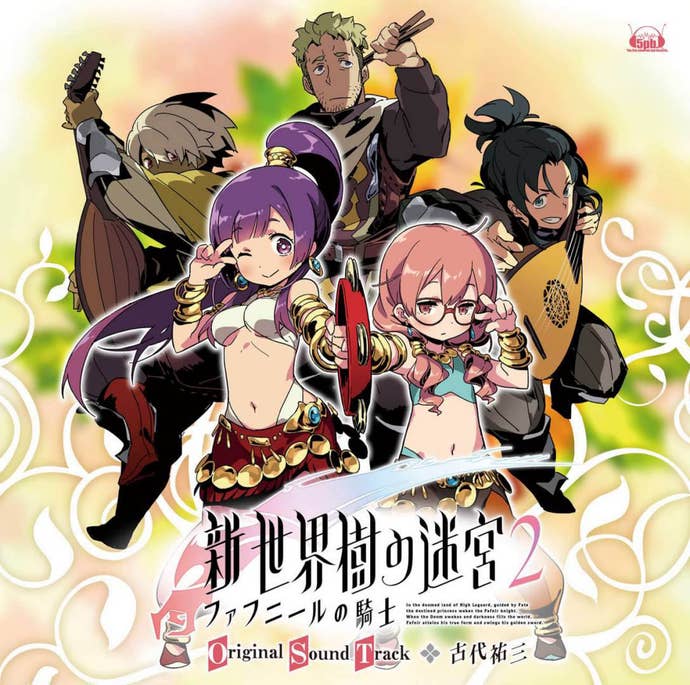
While the new story mode offers more content — frequent story sequences and dialogue, a bonus dungeon, town-building and shop management minigames — both story and classic modes play out almost like entirely new games. Atlus has rebalanced the difficulty level, which was preposterously high in the DS version. Here, the "expert" mode remains soul-destroyingly difficult, while "normal" is tough but not unrelenting, and "picnic" has been nerfed so comprehensively you can defeat most bosses with a stern look and random button-mashing. It really does a fantastic job of running the gamut of accessibility, with something for everyone from absolute gluttons for punishment to the pathologically timid.
In a sense, story mode may actually be more difficult than classic, since you're given a far more limited team to work with. Grimoire stones help mitigate the preset party you take along in story mode, but ultimately your team is designed with a single heavy-hitter (the titular Fafnir Knight) with everyone else serving in more of a support role. On the other hand, classic mode gives you an astonishing array of potential classes to choose from and enough guild slots to make multiple characters of each role; not only are the original Etrian Odyssey II's bonus classes unlocked from the beginning, you also have new options in Etrian Odyssey III's Sovereigns and the optional Highlander from the first Untold. If story mode is arguably too limiting in its party options, classic errs in the other direction — not that choice is bad, exactly, but with only five active party slots, choosing an optimal team can be paralyzing. For example, there are no less than four front-line damage-focused classes to pick from; do you main your main the classic Landsknecht, the fragile Ronin, the life-extending Sovereign, or the mighty Highlander?
The upside is that Untold 2 moves at a much faster clip than the original Etrian Odyssey II did, so you don't necessarily have to commit; there's enough variety here, and substance, to justify a second playthrough. In fact, that's part of the design; my dual-play approach is actually a foolish way to experience Untold 2, since completing the game opens a New Game + that allows you to jump into the alternate play mode with a few bonus perks under your belt.
The original Etrian Odyssey made me into a fan of first-person dungeon RPGs, though the difficulty and pacing turned off many people. Untold 2 goes a long way toward smoothing over those rough patches; it's an excellent RPG that any fan of the genre (not just of dungeon crawlers) should be able to sink their teeth into. With a huge array of party/combat options, inventive and devious foes, and your choice of either maximal or minimal narrative, Untold 2 brings a brilliant degree of accessibility to the series' addictive fundamentals: The map-making, the team-building, and all that wonderful music. The dungeon crawlers has seen quite a revival over the past decade, thanks in large part to this series, and you have plenty to choose from these days... but for my money, Etrian Odyssey is still the one to beat. Untold 2 simply secures its lead for a while longer.
InterfaceThe most straightforward yet flexible frontend for the series yet: It easy to use, but offers a ton of features.
Lasting AppealWith two modes, multiple (freely changeable) difficulty levels, and tons of player choice, there's quite a time sink waiting here.
SoundYuzo Koshiro's score is glorious in either modern orchestrated or retro chiptune modes. The only sour spot are the dubbed voices.
VisualsWhile the graphics won't astonish you, they're still several cuts above most games of this genre.
ConclusionThe latest, and greatest, refinement of Atlus' Etrian Odyssey series, Untold 2 really manages to weave a ridiculous number of options into and around the basics of the franchise. All its best trademark elements — F.O.E.s, great tunes, map-making — remain intact, while elements that tend to be more a matter of taste (its difficulty level, its minimal story) can be tweaked to the player's preferences. A huge, thoughtful, and all-around well-made addition to the series that belongs in every RPG fanatic's collection.


